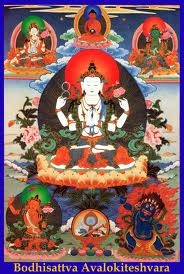Difference between revisions of "AVALOKITEŚVARA-DHĀRAṆĪ"
(Created page with "thumb|250px| <poem> AVALOKITEŚVARA-DHĀRAṆĪ name given by H. W. Bailey to a Buddhist text written in archaizing Late {{Wiki|Khotanese}}, e...") |
|||
| Line 1: | Line 1: | ||
[[File:Im245.jpg|thumb|250px|]] | [[File:Im245.jpg|thumb|250px|]] | ||
<poem> | <poem> | ||
| + | |||
| + | |||
| + | |||
[[AVALOKITEŚVARA-DHĀRAṆĪ]] | [[AVALOKITEŚVARA-DHĀRAṆĪ]] | ||
| Line 6: | Line 9: | ||
| − | [[AVALOKITEŚVARA-DHĀRAṆĪ]], [[name]] given by H. W. Bailey to a [[Buddhist text]] written in archaizing Late {{Wiki|Khotanese}} (q.v.). The text was so called because it ends with a [[dhāraṇī]] (Skt. “[[spell]], [[sacred formula]]”) that is preceded by homage to the [[bodhisattvas]] headed by the [[bodhisattva Avalokiteśvara]]. It has been published so far in transcription only (H. W. Bailey, {{Wiki|Khotanese}} Texts III, {{Wiki|Cambridge}}, 1956, pp. 1-13). It may be a translation from a [[Sanskrit]] original, but no source text has so far been identified. In the nineteen surviving folios the [[bodhisattva | + | [[AVALOKITEŚVARA-DHĀRAṆĪ]], [[name]] given by H. W. Bailey to a [[Buddhist text]] written in archaizing Late {{Wiki|Khotanese}} (q.v.). The text was so called |
| + | |||
| + | because it ends with a [[dhāraṇī]] (Skt. “[[spell]], [[sacred formula]]”) that is preceded by homage to the [[bodhisattvas]] headed by the [[bodhisattva | ||
| + | |||
| + | Avalokiteśvara]]. It has been published so far in transcription only (H. W. Bailey, {{Wiki|Khotanese}} Texts III, {{Wiki|Cambridge}}, 1956, pp. 1-13). It may | ||
| + | |||
| + | be a translation from a [[Sanskrit]] original, but no source text has so far been identified. In the nineteen surviving folios the [[bodhisattva | ||
| − | + | Avalokiteśvara]] is frequently addressed in the {{Wiki|vocative}}. Great {{Wiki|emphasis}} is laid in the text on his [[compassion]], and it is on account of this [[quality]] in | |
| − | + | particular that he became popular not only in [[Tibet]], [[China]], and [[Japan]], but also in [[Ceylon]] and elsewhere in [[southeast]] {{Wiki|Asia}}. | |
| − | (R. E. Emmerick) | + | [[Bibliography]]: |
| + | |||
| + | See also [[R. E. Emmerick]], A Guide to the {{Wiki|Literature}} of [[wikipedia:Khotan|Khotan]], {{Wiki|Tokyo}}, 1979, p. 38. | ||
| + | |||
| + | ([[R. E. Emmerick]]) | ||
Originally Published: December 15, 1987 | Originally Published: December 15, 1987 | ||
| − | |||
| − | + | ||
| − | |||
</poem> | </poem> | ||
| + | |||
{{R}} | {{R}} | ||
[http://www.iranicaonline.org/articles/avalokitesvara-dharai-name-given-by-h www.iranicaonline.org] | [http://www.iranicaonline.org/articles/avalokitesvara-dharai-name-given-by-h www.iranicaonline.org] | ||
[[Category:Dharani]] | [[Category:Dharani]] | ||
[[Category:Avalokiteshvara]] | [[Category:Avalokiteshvara]] | ||
Latest revision as of 05:59, 24 November 2020
AVALOKITEŚVARA-DHĀRAṆĪ
name given by H. W. Bailey to a Buddhist text written in archaizing Late Khotanese, ending with a dhāraṇī (Skt. “spell, sacred formula”) preceded by homage to the bodhisattvas.
AVALOKITEŚVARA-DHĀRAṆĪ, name given by H. W. Bailey to a Buddhist text written in archaizing Late Khotanese (q.v.). The text was so called
because it ends with a dhāraṇī (Skt. “spell, sacred formula”) that is preceded by homage to the bodhisattvas headed by the [[bodhisattva
Avalokiteśvara]]. It has been published so far in transcription only (H. W. Bailey, Khotanese Texts III, Cambridge, 1956, pp. 1-13). It may
be a translation from a Sanskrit original, but no source text has so far been identified. In the nineteen surviving folios the [[bodhisattva
Avalokiteśvara]] is frequently addressed in the vocative. Great emphasis is laid in the text on his compassion, and it is on account of this quality in
particular that he became popular not only in Tibet, China, and Japan, but also in Ceylon and elsewhere in southeast Asia.
Bibliography:
See also R. E. Emmerick, A Guide to the Literature of Khotan, Tokyo, 1979, p. 38.
(R. E. Emmerick)
Originally Published: December 15, 1987
